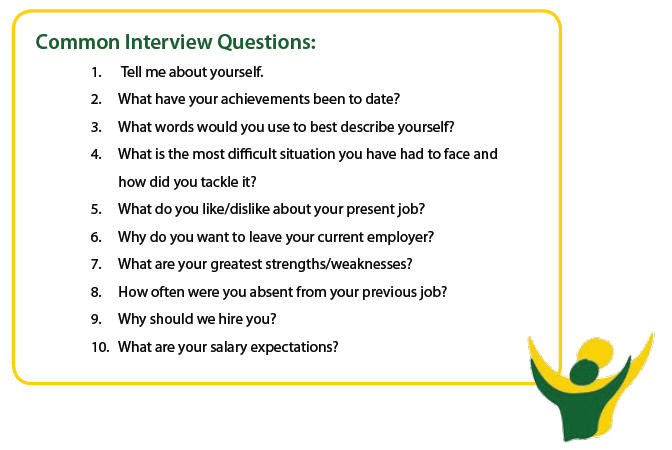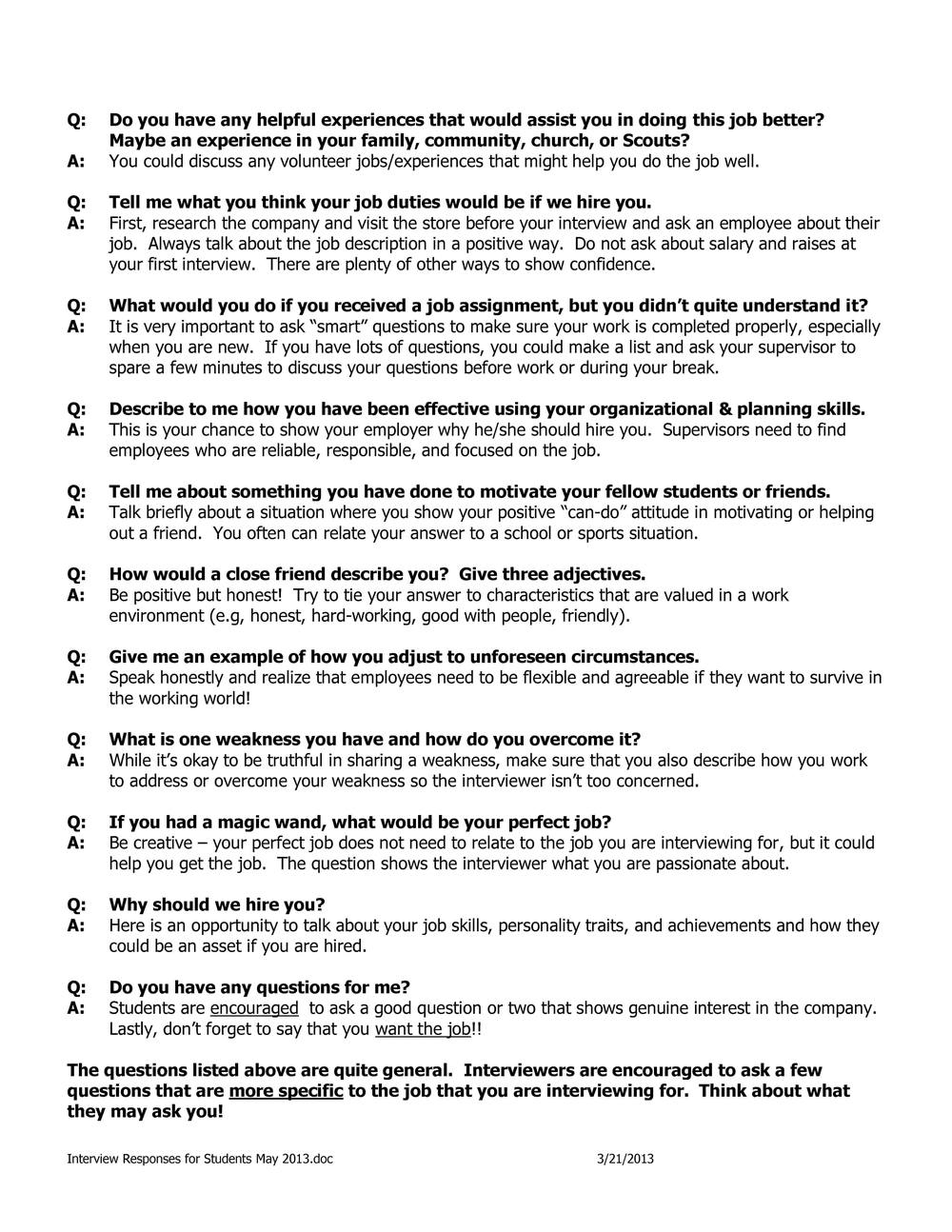9+ Tips for Job Interview Questionnaire Examples
So you passed the written exam, big deal! A lot of people can do that, truth be told. But it is in the interview part wherein the fate of your job application gets decided. Because at the end of the day, it is not just about your intelligence quotient (IQ), it is also about your emotional intelligence (EI) with regards to the person’s ability on how he or she answers the interviewer’s questions.
In your days during the university, there is always this mandatory course that pertains to business communication or business writing that allows the students to practice their skills that may be used in the future soon (e.g. preparing for a job interview, writing a resume and a proper application letter). You may also see examples of interview questions for your reference.
Common Interview Questions Example
Before the Interview
1. Know as much about the company as possible.
Conduct research beforehand so that the moment you step into the same room with the job interviewer, you might be able to answer all the questions that the one conducting the interview will throw at you. Should this be your first job interview, then it is more than important for you to show the interviewer how much you know about the company. You may also see what is the importance of a questionnaire?
2. Research the company’s profile and background.
It is not only stupid, but also just dumb and plain ignorant for a person to waltz in to the company and just hand in his or her own resume along with the job application letter to the human resource (HR) manager without even having the slightest clue or idea as to what the company does or why it even exists in the first place.
3. Think of questions to ask your interviewer.
There are just some facts or details not found in the Internet that only by personally asking can you know the answer. The problem with some job applicants is that they are normally shy to do so or perhaps they have a feeling that it will be considered an insult to even ask a question in the first place. Don’t worry. It is not. If you do not ask bring up any clarifications or queries you may eventually regret it when the time comes. You may also see health questionnaire examples.
4. Ask questions that reflect your interest in future prospects.
The sole purpose of employment is not only to earn money or support your family, but it is also for personal growth and maybe even spiritual growth as a person. Think of whatever possibilities that might await you when you apply to the company. “Which are new markets the company is planning to explore in next couple of years?” or “What are the chances for professional growth in this job opportunity? These are some of the questions that you can try to bring up. You may also like what is a survey questionnaire?

5. Ask questions to bond with the interviewer and project your enthusiasm.
Camaraderie is always advised between you and your interviewer. Keep cool and calm always. Try not to give the impression of being too serious to your interviewer. Be courteous and remember to always show a good disposition to show how interested you are for the job. You may also check out evaluation questionnaire examples & samples.
6. Ask questions about what is discussed during the interview itself.
If there are some aspects or details that you need some clarifications with, do not be shy to bring that up with the interviewer. As mentioned before, once you get accepted for the job, it might be too late to bring up any concerns to the HR.
7. Practice with a friend.
Or even better, try practicing with a teacher or with an actual professional as they would know how to judge your answers for the interview questions that they will ask you. One important tip is to know basically what you want to talk about before the interview. If you know what you are going to talk about, then you are going to do just fine. And try your best to accept feedback. It may be positive or even negative, but it does matter. You can never expect anything from a job interview, but you can always prepare for it. You might be interested in how to prepare a questionnaire.
8. Anticipate questions from the interviewer.
Be prepared for anything– even for the questions that will be asked during the interview. There is no standard interview that companies are required to follow since each institution has their own way of conducting the interviews. That is why it is important to research ahead at some of the potential questions that the interviewer might ask you. Honesty is everything. If you do not know something, just admit it. If you know the answer to that particular query, answer it. There is no shame and wrong in admitting that you do not know the answer to something. Lying to the company will only make things worse for you at your end. You may also see assessment questionnaire examples.
Job Interview Questions with Sample Responses Example
The Day of the Interview
1. Dress for work.
This is the day! This is the day! Are you ready for it? Try to remember that you dress to impress, always. If you remember that scene from The Pursuit of Happyness, Will Smith’s character was not exactly dressed as the top performer he is at the end of his Dean Witter internship. Due to a number of complicated reasons, he showed up in the office with this shabby clothes.
Although he still managed to ace the interview somehow and landed in as an unpaid intern, please be advised that it is NOT okay to do that. You are going to attend an interview in a professional work environment, and you cannot show up dressed as someone attending club party. Business attire wold often be best. Nothing says professionally-dressed best than a blazer with a formal polo and a necktie. You may also see sports questionnaire examples & samples.
2. Show up in the best possible shape.
And no, this does not mean your weight. This just refers to the oneself before the interview proper such as showing up early before the interview proper. And yes, there is an issue of being too early or too late. If you arrive to the interview proper at least an hour early, then you would just be wasting your time there. Although, in some cases, if the interviewer sees that you have arrived earlier then you can always begin the interview then and there so that both of you can go back to your business. If you arrive 15 to 20 minutes too late, well, that is another story altogether.
There might be some interviewers who might brush it aside because of work priorities, while some might even ask you to come back the next day since they might be too busy already to attend to you. Aside from being prompt, it does not hurt to eat a healthy or a hearty meal. Just make sure that you are already stuffed and ready to go! Last but not the least, try to bring an extra copy of your resume or curriculum vitae (CV) just in case or perhaps your portfolio to show to your interviewer that serves as sufficient basis to your skills and talents. You may also like survey questionnaire examples.
3. Show courtesy to everyone during the interview.
But not just with the interviewer. You have to show courtesy to each and everyone you see and meet in the premises. From the receptionist to one of the employees who are working there. Showing courtesy is just common sense.
Look everyone in the eye and smile. It does help to smile. Honestly. It can even lighten up the darkest of days to even people you do not know very well. By looking them in the eye means that you are giving him or her your undivided attention and your thoughts are not elsewhere. You may also check out examples of questionnaire for customer satisfaction.
- Speak clearly and say “please” and “thank you.” Remember while you are waiting for your name to be called during the interview, do not forget to say these magic words in case you requested for a follow-up with the person who was supposed to conduct your interview.
- Don’t noodle around on your phone or electronic device while waiting. Most people would do this when they are normally waiting for their name by the interviewer. Well, try not to. To some, it is considered rude. There are better things that you can be doing while waiting for your turn such as reading the paper or just simply wait. You might be interested in service questionnaire examples & samples.

4. Be honest.
Honesty is indeed the policy. Let it all out (not your feelings. But just the information that the employer needs to know about you). Try to not to mislead your interviewer by stating the qualities you do not possess, or the companies you have worked with for the entirety of your life, or even about your weaknesses. Much more so with the awards that you have earned during your school years.
Once you lie to your employer, your record will be smeared by your lies and deceit and it will not be easy to remove since it will be reflected on you. It pays to be honest. But try not to be too honest as well. Become too honest and you might end up risking your job application as well. Only disclose the information that they need to know. You may also see product questionnaire examples & samples.
5. Keep things simple and short.
Apply the K.I.S.S. rule and nothing can go wrong. It is best to remember that you are not telling about your life story, but you are in an interview with your employer, and it is a formal one. Try your best to structure your responses to at least 45 to 90 seconds each. You go any less than that an you may be perceived as someone as unqualified for the position in which the employer will have lost all interest to continue the interview with you. At the “tell me about yourself” question, highlight at least 2 to 3 illustrative examples about yourself before wrapping up.
At all costs, avoid using slang or off-color humor during your interview. Depending on the position you are applying for, language is very important. Remember to not only dress smart, but to also talk smart as well. It’s also a good rule to avoid off-color humor; you never know when someone might take offense, and it’s best not to risk it. You may also like questionnaire templates & examples.
6. Be personable.
The best people are always themselves. Become too plastic and it eventually becomes obvious that you are not you. If you are pessimistic, then try toning it down a bit. In that way, the one conducting the interview will get to understand you as a person better. Whether they would actually hire you or not is another entire scenario altogether. You may also check out how to develop a questionnaire.
Top 5 Best Interview Questions Example
10 Common Job Interview Questions
It was mentioned before that different companies have their own type of questions that they would ask towards job applicants. While that fact cannot be denied, they more or less ask the same kind of things that is normally expected for an interview. So it would be better if you prepared yourself for these kinds of questions that would be asked of you in a job interview: You may also see employee interview questionnaire.
1. “Tell me a little about yourself that is not found in your resume”.
Resumes are like the book summaries in a novel. They give you the whole picture about you an your life in just a few paragraphs. Aside from your basic contact and family information, resumes normally consist of your academic life, your work experience, your received awards that you have earned from the academe or perhaps during your extra-curricular activities, as well as your hobbies and contact references. So what exactly can you reveal about yourself that is not already found in your resume? Think hard and dig deep. You may find the answer.
2. “What are your biggest weaknesses?”
Shocking, right? But it is not a joke. Interviewers tend to ask this to their job applicants. It may be uncomfortable at first, or perhaps you would not feel like sharing any of this at all. But when you have to, you have to. And one more thing, you cannot say you have no weaknesses. Because saying that can only lead to two conclusions: you are either some deity in human form or you are either the biggest liar in the entire universe. Everyone has their own weaknesses, qualms and flaws in life. You just have to admit them. There are people that are lazy, there are people who have irredeemable qualities, there are people who are pessimistic, there are people who see the world in an entirely different way. Whatever it is, you just need to have the courage to admit it. You may also see research questionnaire examples & samples.
3. “What are your biggest strengths?”
Just as there are weaknesses, there are also strengths. All of us may not be perfect, but everyone of us has our moments in life. There are times when we excel, there are days when we manage to do better by exceeding our limits. There are days when we deserve a trophy for all our hard work and perseverance. And that is true. So that is why it is important to give yourself a bit of credit once in a while. What are all the good qualities in a person? Hardworking, intelligent, persevering, good, kind, adaptable, willing to learn, innovative. Whatever it is, list them down to let the employer know what kind of person you are. You may also like student questionnaire examples.
4. “Where do you see yourself in five years?”
Considering that you just got out of college, your first priority would obviously be to find a job. For people with the desire to pursue further education, their next priority would be to take up Masters at some other university. But to be asked where you will be 5 years from now, you have to give yourself some time to think. For starters, you cannot say that you do not know. It would give the employers a bad idea that you do not have any particular goals in mind. It is OK to think big. It is OK to be ambitious. It is OK to have huge goals in life. So, feel free to mention them. If you are not entirely sure, you can always add a ‘maybe’ to give them at least some idea of what your goals are. You may also check out risk assessment questionnaire samples.
5. “Out of all the other candidates, why should we hire you?”
A very common question, but you have to be careful in answering this. A word of advice: exercise humility at all times. Do not even try to compare yourself with other employees, especially if this is your first job application interview. You do that, you will just be perceived as someone very boastful. Do not say that you are the best, nor do you say you are the worst. But say that even though there are other people who are more qualified for the position than you, you will do everything in your power to perform well with minimal supervision. And that you will exert the effort to be adaptable to the company’s standards and policies. Sounds formal and honest, don’t you think? You might be interested in examples of self-administered questionnaire & samples.

6. “How did you learn about the opening?”
This question is a no-brainer. Did you find this in a newspaper clipping? Did you see this job advertisement in a billboard somewhere? Did you find this online?
7. “Why do you want this job?”
Interviewers ask this question for one purpose only: to learn your intentions about why you are applying here. Out of all the millions of positions and a gazillion companies the universe has to provide and offer, why this one? What made you attracted to this job? Is it because of the high-paying salary the company provides there? Is it because you believe that you will get famous when you work there? Is it because the job itself is exciting? Does the job provide more benefits and perks than your previous job (if applicable)? Is it nearer to where you live? Be honest about this. You may also see business questionnaire examples & samples.
8. “What do you consider to be your biggest professional achievement?”
If this is your first job, then rest assured, this question does not apply to you. But if it is your second or third one, you are expected to answer this question. Now, don’t say that over the years you have worked, there is nothing that you can call your biggest personal achievement? There has to be some sort of legacy that you have left behind before moving on. You may also like training questionnaire examples & samples.
9. “What kind of work environment do you like best?”
Work environments vary per the kind of institution you are planning to work for. If you are planning to work as a call center agent, you are expected to reach a certain quota of how many calls in a day before you head home. And depending on the kind of calls you receive, it is normally stressful which is why their offices are equipped with stress-relieving equipment that they use to help ease themselves. If you are working as a fast food service crew, it is typically fast-paced where you are expected to serve customers their meals and orders running around from area to area. So once you commit yourself to that job, make sure you commit to the work. You may also check out marketing research questionnaire examples & samples.
10. “What can we expect from you in your first three months?”
The first 3 months of a job are often the most important as the supervisors and managers will often oversee your training as to whether you are able to perform as quick and as efficient as the others or are you constantly lagging behind resulting to a very low productivity rate. You have to answer them that you will be performing at your best, even though the challenges of the job are new to you. You might be interested in interview questionnaire examples.
Once you ace the interview, you are already set on your path to your new job. And remember that to hold on to what you have said during the job interview about performing your best, always.





